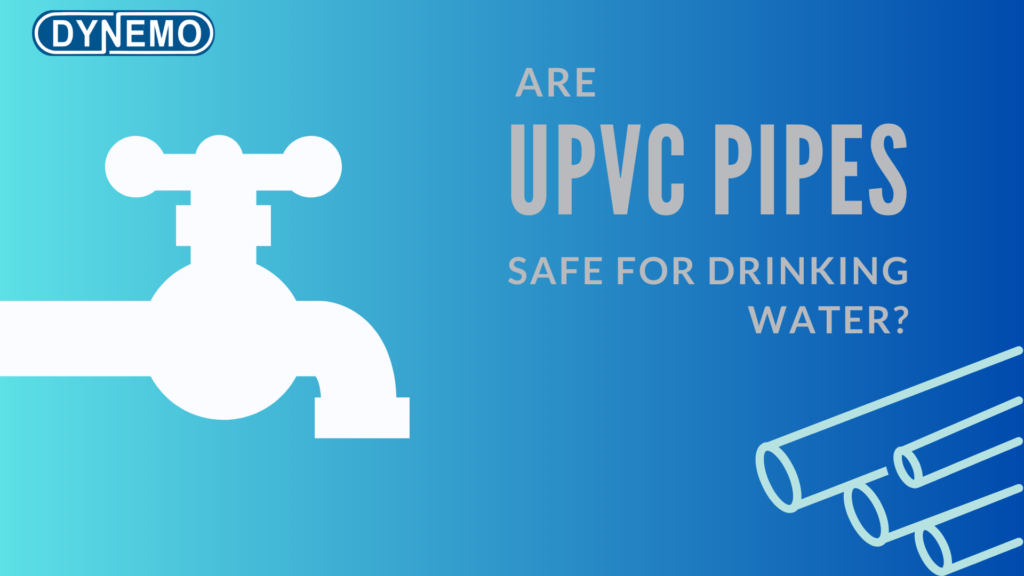Why choose Dynamo Industries UPVC pipes safe for drinking water?
Water security is one of the most important responsibilities. With so many options in today’s market, choosing the right one can be challenging. When it comes to drinking water, Dynamo Industries’ UPVC pipes may provide a reliable and durable solution.
Due to the growing awareness of clean drinking water, the demand for safe and durable water pipes has increased significantly. With so many options, it can be difficult to determine which pipes are the safest and most reliable for carrying drinking water. In this article, we will explore why choosing Dynamo Industries UPVC pipes is the right decision to ensure drinking water safety and purity.
Dynamo Industries UPVC pipes are made from high-quality, non-toxic materials approved for use with potable water. UPVC stands for unplasticized polyvinyl chloride, which means that the material used to make these pipes is not softened by plasticizers.
We offer high levels of safety and reliability. They are designed to withstand everyday use while ensuring clean, pure, and free of harmful contaminants.
Are UPVC Pipes Safe for Drinking Water?

The safety of UPVC pipes for drinking water is a controversial topic. While some experts argue that UPVC pipes are safe, others raise concerns about the potential risks.
Potential Risks of Drinking Water from UPVC Pipes: There are several potential risks associated with drinking water from UPVC pipes:
Chemical Leaching: UPVC pipes may release chemicals such as lead, cadmium, and phthalates into the water, which can be harmful to human health.
Microbial Growth: UPVC pipes can provide a suitable environment for microbial growth, which can lead to the growth of harmful bacteria and viruses.
Cross-Contamination: UPVC pipes can become contaminated with other substances, such as pesticides or fertilizers, which can then be transferred to the drinking water.
How to Ensure Your UPVC Pipes are Safe for Drinking Water

To ensure that your UPVC pipes are safe for drinking water, there are several steps you can take:
Choose High-Quality Pipes: Choose UPVC pipes that meet international standards for drinking water quality.
Regular Testing: Regularly test your drinking water for contaminants, including chemicals and bacteria.
Regular Cleaning: Regularly clean and disinfect your UPVC pipes to prevent microbial growth
What is UPVC and What Makes it a Suitable Pipe Material for Drinking Water?
UPVC, or unplasticized polyvinyl chloride, is a type of plastic material that is commonly used for water pipes in many parts of the world. It is a non-toxic material that is resistant to corrosion and chemical degradation, making it an ideal choice for drinking water systems. In this article, we will explore the properties of UPVC and why it is a suitable pipe material for drinking water.
Why is UPVC a suitable pipe material for drinking water?
Safe drinking water has become a critical global issue in the modern era. The quality of water supplied to homes must be the highest standard possible to protect consumers from waterborne illnesses. Therefore, using suitable materials for pipes that transport water is crucial. Unplasticized polyvinyl chloride (UPVC) is a common material for pipes that transport drinking water, and it has gained popularity over the years. This article will explore why UPVC is a suitable pipe material for drinking water. UPVC is a suitable pipe material for drinking water for several reasons. First, it is a non-toxic material that does not release harmful chemicals into the water supply. This is important because the quality of the water supply is critical for public health. Second, UPVC is resistant to corrosion and chemical degradation, which means it can withstand exposure to various chemicals and environmental conditions. This is important because the water supply can be exposed to various contaminants, including chemicals and minerals. Third, UPVC is a durable and long-lasting material lasting up to 50 years or more. This is important because it reduces the need to maintain and replace water pipes.
Advantages of UPVC Pipes for Drinking Water
In the second section of the article, we will explore the advantages of using UPVC pipes for drinking water transportation.
Non-Toxic
One of the main advantages of UPVC pipes for drinking water transportation is their non-toxic nature. The material does not contain harmful chemicals that can leach into the water, making it safe for human consumption. UPVC pipes are also odorless and tasteless, ensuring that the water remains fresh and uncontaminated.
Corrosion Resistance
UPVC pipes are resistant to corrosion, which makes them ideal for use in harsh environments. The material does not react with the water, preventing the formation of rust and other harmful substances. Corrosion can cause leaks and contamination of the water, but UPVC pipes eliminate this risk.
Easy Installation
UPVC pipes are lightweight and easy to install, making them a cost-effective option for water transportation. The material is also easy to cut and join, reducing installation time and labor costs. UPVC pipes have a smooth surface that does not require any additional coatings, making them a low-maintenance option.
Longevity
UPVC pipes have a long lifespan, making them a durable option for water transportation. The material can withstand harsh weather conditions, impacts, and pressure, ensuring that the pipes last for many years. UPVC pipes do not degrade over time, which means that they will not require replacement frequently.
If you are looking for reliable and high-quality UPVC pipes, Dynemo Industries, a UPVC pipes manufacturer should be your go-to choice. With a wide range of options and a proven track record of providing safe drinking water pipes,
Dynemo Industries is a trusted name in the industry and a vast UPVC pipes manufacturer in Ahmedabad. By choosing UPVC pipes from Dynemo Industries, you can be assured of a durable, corrosion-resistant, and non-toxic material that will provide safe drinking water for years. So, don’t hesitate to fulfill your pipe needs with Dynemo Industries’ UPVC pipes.



